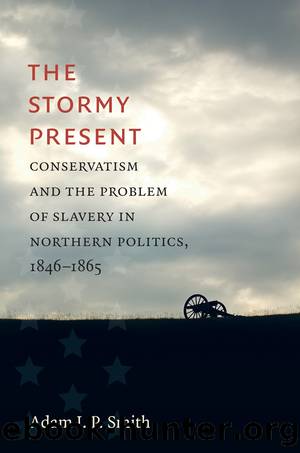The Stormy Present by Smith Adam I. P

Author:Smith, Adam I. P.
Language: eng
Format: epub
Publisher: University of North Carolina Press
CHAPTER SIX
The Essence of Anarchy
Secession and the War against Slaveholders
Having virtually imprisoned his aging father to prevent him from endorsing the Black Republicans, George Dock, the Harrisburg doctor and committed lifelong Democrat, thought the nation was descending into madness. In the weeks following Lincolnâs election, first South Carolina and then six other Deep South slave states seceded and formed a southern Confederacy while rumors swirled of slave uprisings and of arms being stockpiled in anticipation of civil war.1 Dock anxiously watched the âpolitical barometer of our nation, as its heavy mercurial columns had been heaving and vibrating under the wild perturbations and stormy convulsions that have been rocking our noble ship with their fearful surges.â2 The Union had never been lashed by storms so severe.
The conventional wisdom among Democrats, echoing the spirit of Jefferson, was that the larger the Republic, the safer liberty would be. A big country was harder to corrupt than a small one, went the logic. And those who had remained loyal to the Democracy still believed, as they had always done, that their party represented âthe only hope for the Union.â3 The South should have stayed to fight abolitionist âheresiesâ from âinside of the Union,â wrote an Indiana Democrat. That they had chosen to secede in response to an electionâeven one that had seen a âfanatical Black Republicanâ electedâmeant they had â[forsaken] the maxims of Jefferson.â4
Democratsâ bewilderment that âour Southern friendsâ were in effect cooperating with Black Republicans to dismember the Union was accompanied by indignation.5 Theo Williams, an old Illinois crony of Stephen Douglas, fumed that the Southern wing of the party had âproved themselves as much a sectional party as the Abolition Republican Party.â The treason was first evident, Williams thought, when the Southern wing of the party reneged on the âcommon policyâ of ânon-intervention in the Territoriesâ and demanded a federal slave code that they knew would ânever, neverâ be acceptable to Northern Democrats: by giving up on the unity of the national party, they gave up on the Union.6
In those first weeks after Lincolnâs election, Democrats often tended to pathologize the âfanaticismâ on both sides.7 As Victor Piollet of Pennsylvania put it, conservative men like him were surrounded, all of a sudden, by âinsanity.â8 Anticipating the âblundering generationâ thesis of the 1930s revisionist historians, the âinsanityâ analysis was often accompanied by resentment at the manipulation of these feelings by unscrupulous politicians. The Kentuckian Robert Anderson, a staunch Democrat and a major in the U.S. Army who was soon to find himself at the epicenter of the storm as the commander of Union forces at Fort Sumter, wrote sadly in early March 1861 that âdishonesty and bad faithâ had âtainted the moral atmosphere of portions of our land. And alas how many have been prostrated by its blast.â9
By reaching for the âinsanityâ explanation, these lifelong Jacksonians revealed their imaginative failure to understand how quickly politics had changed. Typical were the Bigler brothersâWilliam and Johnâwho had come of age in the 1830s when they set up a Jacksonian newspaper in Bellefonte, Pennsylvania.
Download
This site does not store any files on its server. We only index and link to content provided by other sites. Please contact the content providers to delete copyright contents if any and email us, we'll remove relevant links or contents immediately.
| Africa | Americas |
| Arctic & Antarctica | Asia |
| Australia & Oceania | Europe |
| Middle East | Russia |
| United States | World |
| Ancient Civilizations | Military |
| Historical Study & Educational Resources |
Never by Ken Follett(2873)
The Man Who Died Twice by Richard Osman(2291)
Machine Learning at Scale with H2O by Gregory Keys | David Whiting(2269)
Fairy Tale by Stephen King(2059)
Will by Will Smith(2033)
Rationality by Steven Pinker(1761)
The Dawn of Everything: A New History of Humanity by David Graeber & David Wengrow(1565)
The Dark Hours by Michael Connelly(1563)
Principles for Dealing With the Changing World Order: Why Nations Succeed and Fail by Ray Dalio(1368)
Friends, Lovers, and the Big Terrible Thing by Matthew Perry(1324)
A Short History of War by Jeremy Black(1295)
HBR's 10 Must Reads 2022 by Harvard Business Review(1251)
Go Tell the Bees That I Am Gone by Diana Gabaldon(1231)
Can't Hurt Me: Master Your Mind and Defy the Odds - Clean Edition by David Goggins(1223)
515945210 by Unknown(1205)
Fear No Evil by James Patterson(1106)
443319537 by Unknown(1069)
Works by Richard Wright(1017)
Going There by Katie Couric(989)
